|
|
|
Sort Order |
|
|
|
Items / Page
|
|
|
|
|
|
|
| Srl | Item |
| 1 |
ID:
058096
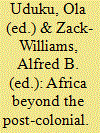

|
|
|
|
|
| Publication |
Aldershot, Ashgate, 2004.
|
| Description |
xiv, 140p.
|
| Series |
Interdisciplinary research series in ethnic, gender and class relations
|
| Standard Number |
0754631710
|
|
|
|
|
|
|
|
|
|
|
|
Copies: C:1/I:0,R:0,Q:0
Circulation
| Accession# | Call# | Current Location | Status | Policy | Location |
| 048987 | 306.096/UDU 048987 | Main | On Shelf | General | |
|
|
|
|
| 2 |
ID:
153683


|
|
|
|
|
| Summary/Abstract |
African American and Black Caribbean relations dominate research on interactions across black ethnic divides. Using National Survey of American Life data, we explore a different aspect of black interethnic attitudes: how close these groups feel towards Africans. African Americans and Black Caribbeans were largely similar in their feelings of closeness to Africans. For Black Caribbeans, younger and male respondents, those reporting higher levels of financial strain, living in the northeast and persons who immigrated to the US at least 11 years ago, report feeling especially close to Africans. Being male was the only significant correlate among African Americans. The findings are discussed in relation to how race, ethnicity and national origin shape personal identities within the US and their significance for intergroup perceptions. These broader issues warrant further consideration in light of assertions that race as a defining feature of American life and intergroup relations is obsolete.
|
|
|
|
|
|
|
|
|
|
|
|
|
|
|
|
| 3 |
ID:
155793
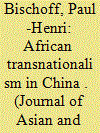

|
|
|
|
|
| Summary/Abstract |
The growing presence of a diversifying group of Africans in China raises broader issues of their status and permanence. The politics associated with African transnationalism in China are evident in Chinese and African government responses and the transnational African voice. This article looks at facets of an African transnational presence and some key responses at a local, international and transnational level to suggest an evolving state of Sino-African relations in which African multilateralism and the transnational African actor play a greater part.
|
|
|
|
|
|
|
|
|
|
|
|
|
|
|
|
| 4 |
ID:
144408
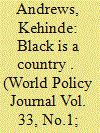

|
|
|
|
|
| Summary/Abstract |
Racism transcends borders and so too must the fight against it, argues Kehinde Andrews. Too often, analyses of race are hemmed in by “methodological nationalism,” or the tendency to frame our thinking around the nation-state. Instead, Andrews says, the African diaspora should unite across oceans and boundaries to form a country based on freedom and equality for Black populations.
|
|
|
|
|
|
|
|
|
|
|
|
|
|
|
|
| 5 |
ID:
135208
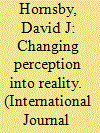

|
|
|
|
|
| Summary/Abstract |
Canadians tend to perceive Canada’s historic engagement and influence in Africa in ways very much disconnected from reality. Canada’s self-image as a humane internationalist country deeply engaged with Africa relies on an idealized version of history. Nevertheless, there have been times when the reality of Canadian foreign policy engagement with Africa has been much closer to that ideal than it is now. This paper seeks to contribute to the debate on Canada–Africa relations by building greater understanding of Canada’s position in Africa. It tackles the question of Canada’s engagement with Africa by analyzing three broad aspects of a possible relationship between a developed country and developing region: the economic, developmental, and trans-societal. Analysis of these three areas of interaction provides insight into what could be done to renew or reinvigorate Canada’s engagement with Africa.
|
|
|
|
|
|
|
|
|
|
|
|
|
|
|
|
| 6 |
ID:
096822
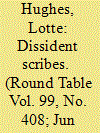

|
|
|
|
|
| Publication |
2010.
|
| Summary/Abstract |
Despite a growing body of work on anti-colonialist movements and the activities of individual activists, there remain large gaps in our knowledge of early agitation in and around Africa, and the links between people. A scholarly focus on transnational networking in the 1930s to 1950s tends to overshadow earlier agitation, by people whose achievements are too often forgotten now, but who laid the foundations for later struggle, decolonisation, and modern-day humanitarian activity. This article discusses some lesser-known agitators, both European and African, active in Africa in the 1900s (though Colenso began earlier), who used copious correspondence, the press and humanitarian networks to highlight colonial abuses and challenge imperial policy. It focuses largely on, and draws parallels between, Dr Norman Leys (working in East Africa), Henry Nevinson (West Africa), F. Z. S. Peregrino (West and South Africa) and Harriette Colenso (South Africa).
|
|
|
|
|
|
|
|
|
|
|
|
|
|
|
|
| 7 |
ID:
085235
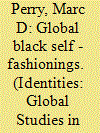

|
|
|
|
|
| Publication |
2008.
|
| Summary/Abstract |
This essay examines how the "black" racial significance of hip hop culture is received, interpreted, and redeployed within the Afro-Atlantic world. Beyond questions of cultural consumption and reproduction, it is argued that hip hop's expanding global reach has facilitated the contemporary making and moving of black diasporic subjects themselves. Here, African descendant youth in an array of locales use the performative contours of hip hop to mobilize notions of black-self in ways that are at one time both contestive and transcendent of nationally bound racial framings. Hip hop in this way can be seen as enabling a current global (re)mapping of black political imaginaries via social dynamics of diaspora. In pursuing this argument, this essay looks toward hip hop movements in Brazil, Cuba, and South Africa as compelling, yet varying examples of how transnationally attuned identities of blackness are marshaled in the fashioning of diasporic subjects through hip hop.
|
|
|
|
|
|
|
|
|
|
|
|
|
|
|
|
| 8 |
ID:
033064
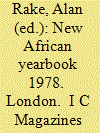

|
|
|
|
|
| Publication |
London, I C Magazines Ltd., 1978.
|
| Description |
258p.Hbk
|
| Standard Number |
0905268024
|
|
|
|
|
|
|
|
|
|
|
|
Copies: C:1/I:0,R:0,Q:0
Circulation
| Accession# | Call# | Current Location | Status | Policy | Location |
| 017684 | 909.9605/RAK 017684 | Main | On Shelf | General | |
|
|
|
|
| 9 |
ID:
182404
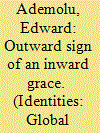

|
|
|
|
|
| Summary/Abstract |
Mainstream development discourse and practice often marginalise the significance of ‘religion’ and ‘faith’ for international development and humanitarianism. However, recent geopolitical events have prompted attitudinal and epistemological developments, with religion and faith considered an almost obligatory agenda for development scholarship. Despite current celebrations, scant attention is paid to the paramount role of religion for faith-based development actors such as African diaspora individuals and communities. Using focus group discussions, this article examines how the religious-faith identities of UK Nigerians specifically, shape their meanings for and engagement in international development. I reveal that Nigerian remittances and non-monetary contributions and services to their heritage country are constituted within moral (and cultural) obligations, justifications and values that are distinctly ‘religious’. So too, that Nigerians largely construe international development as a demonstrable ‘practice’ of their faith-based identities. Consequently, I call for a (re)theorisation of development to subsume transnational Afro-religious diasporic performativity. While focused on Nigerians, these findings are nonetheless relevant for wider UK-based African diaspora.
|
|
|
|
|
|
|
|
|
|
|
|
|
|
|
|
| 10 |
ID:
177979
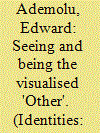

|
|
|
|
|
| Summary/Abstract |
This article examines how humanitarianism representations affect British Nigerian identities. It problematises the tendency within development literature to uncritically generalise British audiences of NGO representations as seemingly white. Studies further assume audiences interpret and are impacted by representations in largely undifferentiated ways. This assumption discounts the complexities and particularities of and within audiences and overlooks how humanitarian representations inform how (and why) audiences negotiate their racialised subjectivities. Applying Bhabha’s hybridity theory, this article reveals how Nigerian diaspora negotiate racialised identities vis-à-vis humanitarian representations in distinct and revelatory ways, including along the lines of social class. These Nigerian subject-makings are contingencies against problematic portrayals of Black African poverty and perceived racism mediated by whiteness. While focused on Nigerians, this work has implications for the racialised realities of UK-based Black Africans.
|
|
|
|
|
|
|
|
|
|
|
|
|
|
|
|
| 11 |
ID:
053220
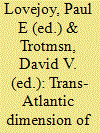

|
|
|
|
|
| Publication |
London, Continuum, 2003.
|
| Description |
vi, 289p.
|
| Series |
The Black Atalantic.
|
| Standard Number |
0826449077
|
|
|
|
|
|
|
|
|
|
|
|
Copies: C:1/I:0,R:0,Q:0
Circulation
| Accession# | Call# | Current Location | Status | Policy | Location |
| 048476 | 305.8960709/LOV 048476 | Main | On Shelf | General | |
|
|
|
|
| 12 |
ID:
157774
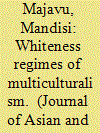

|
|
|
|
|
| Summary/Abstract |
This article uses a newly developed theoretical concept – the ‘uncommodified blackness’ image, to accentuate the discursive methods in which the humanness of Africans is denied in subtle and commonplace ways in Australia. In other words, the concept of uncommodified blackness is used in this study to theorise both the racist infrahumanisation and the blatant racist dehumanisation that Africans are subjected to in Australia. An analysis of semi-structured interviews with 11 research participants suggests that, through the image of uncommodified blackness, the participants are viewed by mainstream Australia as dysfunctional and dirty Others who ought to be avoided in public transport. Participants’ lived experiences imply that mainstream Australia regards them as outsiders and perpetual refugees who are failing at ‘integration’.
|
|
|
|
|
|
|
|
|
|
|
|
|
|
|
|
|
|
|
|
|